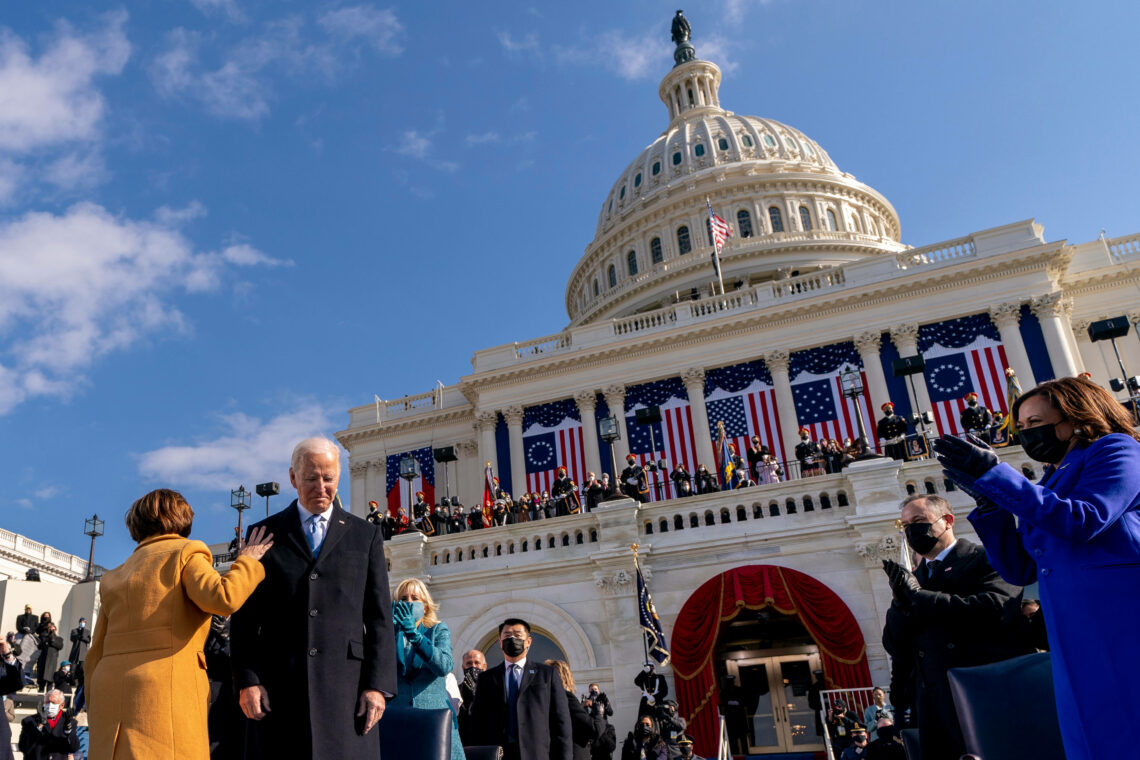The establishment is back in the U.S.
President Joe Biden faces unprecedented challenges both at home and on the international stage. The extreme polarization that characterized the Trump presidency still threatens the American political system – and puts Biden’s premise that “America is back” to the test.

In a nutshell
- Domestic turmoil has led the U.S. to turn inward
- President Biden will need to reassure allies
- A new mode of international cooperation could evolve
Presidential slogans – be they promises to restore the previous order or calls for change – have often been omens of things to come. Joe Biden, the 46th president of the United States, began his term by stating that “America is back.” The context was significant. He made the declaration in his address to the Munich Security Conference, telling Europe and the world: “I am determined to reengage America.”
Mr. Biden may have been alluding to the words of former president Ronald Reagan (1981-1989). Back then,“America is back” meant to signal change after stagnation – and impressive results followed. In the case of Donald Trump, his presidency was marked by the oft-repeated “America first,” which also evoked the impression that some calamity had occurred. But what will come of President Biden’s slogan?
In the international arena, the declaration mostly brought relief. Mr. Biden’s cabinet choices appear reassuring so far, even though restoration of the status quo ante would also be problematic. When trying to predict what President Biden’s “America is back” statement will mean for the future of U.S. policy, an observation by Alexis de Tocqueville comes to mind: “The greatness of America lies not in being more enlightened than any other nation, but rather in her ability to repair her faults.”
The Covid-19 pandemic clearly changed the course of American domestic politics.
So far, President Biden has yet to announce broad-ranging measures that would amount to a sort of New Deal. However, the combined effect of the Covid-19 crisis and the associated recovery program could soon require an initiative of similar proportions. One of the few executive orders given under President Trump that the Biden administration did not rush to withdraw was a ban on exporting vaccines produced in the U.S. While the European Union was hoping to benefit from this surplus, Washington decided to send deliveries to Mexico and Canada instead.
A more serious issue with the concept of “America is back” is that America was never gone. The extremism and bitter polarization that has come to define both the Trump presidency and the Democratic opposition during his term is still clearly visible, for example in the events of January 2021 when Capitol Hill was stormed. Even if these radical pressures are more muted now, both sides of the spectrum continue to engage in self-destructive campaigns. This destabilization could possibly end the two-party system and jeopardize the domestic cohesion needed for American exceptionalism to prevail.
Nexus breakdown
In the late 19th century, American exceptionalism emerged when the U.S. began seeking a global role commensurate with its resources and, with World War I, engaging in global power competitions. By the end of World War II, the U.S. found itself in an unprecedented position – as the leading global power, it could shape new international forms of cooperation and competition.
However, with the end of the Cold War, this sense of purpose on the world scene eroded. Former Secretary of Labor Robert Reich had predicted that: “without the enormity of the external danger, we may lack sufficient identity to get on with the job.” In later years, American political discourse turned inward. Then came the 45th president, Mr. Trump, who sought to disrupt the political establishment on which the U.S.’s domestic stability and global role had been based since the end of the world wars. Now, Mr. Biden’s Interim National Strategy Guidance rightly states that the “traditional distinctions between foreign and domestic policy … are less meaningful than ever.”
Covid-19 disruption
The Covid-19 pandemic clearly changed the course of American domestic politics. Without it, a second Trump term would have been highly likely, and Mr. Biden may not have been the Democratic candidate. The Republicans could have kept both the presidency and the Senate. But even then, domestic polarization would have led to a withdrawal from the global power competition.
Oddly, it was Mr. Trump’s “America first” approach to the vaccine rollout that paved the way for President Biden to lead the country out of the crisis. The new Democratic administration’s huge recovery bill, with payments of $1,400 per person, was narrowly approved by the Senate. The previous bill, foreseeing $2,000 per person, had been blocked under President Trump.

Mr. Biden’s first “defeat” came when his candidate for Director of Office Management and Budget had to withdraw after doubts over whether she would receive Senate approval. In parallel, Mr. Trump is endeavoring to have the Supreme Court support his requests to shield his tax returns from the public. Both events could be foreshadowing trouble.
Like Mr. Trump, President Biden initially operated through presidential decrees, and the slight majority earned by the recovery bill highlighted that his room for political maneuver is narrow. The midterm elections in November 2022 are far from certain to favor the Democrats. The progressive wing of the party is already warning the president against centrism, whereas the Republican Party is likely to shift further toward extreme conservatism, if only not to lose Mr. Trump’s followers.
Deceptive diplomacy
There will be more continuity in the diplomatic sphere – except for rhetoric and style. Mr. Biden has no doubts about the need for allied support in Asia and Europe. His Interim National Strategic Guidance hardly differs from the previous administration’s on containing China and Russia. By and large, it continues to restore multilateralism and cooperation. But the main challenge for the Biden White House will be domestic politics.
At this stage, Mr. Biden’s “America is back” means little more than “the establishment is back.” In his Interim Strategic Guidance, allies are described as “America’s greatest strategic asset.” But the political discourse will focus on domestic priorities and face growing conflicts over the responsibilities of the federal system, especially post-Covid.
Self-regulating system
The self-regulating forces of the American political system may once again turn out to be stronger than what many believe. However, there are two trends at play that could influence American global power. Since the late 1940s, the U.S. has understood its role and geopolitical interests to be best served by fostering “a world environment in which the American system can survive and flourish.” This rationale was driving American multilateralism. The U.S. was investing its vast resources, and parts of the world willing to cooperate became beneficiaries. Then the Cold War ended, and cooperative globalism flourished. But without the need to contain a global competitor, this world order began to recede, and this long before President Trump withdrew from the commitments necessary to maintain this system.
Domestic cohesion is a prerequisite of global power.
Mr. Biden is facing an unprecedented challenge. He will need to reengage allies around the world in circumstances where partners and competitors, especially China, have learned to compete within multilateral frameworks formerly dominated by the U.S. The American global strategy will need to co-opt nations with shared economic interests, albeit with caution, given the systemic competition developing with certain other countries. In other words, Washington will not only need to reassure allies, but it will also have to build a new and effective type of multilateralism. But this may prove challenging with so much internal turmoil.
Domestic cohesion, understood as a shared belief in the constitutional framework, is a prerequisite of global power. In this regard, the U.S. has gone through other episodes when its future appeared uncertain, but the resilience of the nation always prevailed.
Endangered framework
On January 6 of this year, the constitutional order on which U.S. unity is based was endangered by the unprecedented attack on the Capitol. Outgoing President Trump had wanted to prevent Congress from recognizing the results of the November 3 elections, and could have probably prevented the circumstances from escalating since he was aware of the threat. It took the National Guard and the Pentagon some six hours to intervene, a critical delay.
The extremist groups that carried out the attack were described by Republican Senator Ron Johnson as “people who love this country.” Mr. Trump added fuel to the fire by later declaring that the rioters were the beginning of a new movement, raising fears that the Republican Party would eventually splinter. Eleven weeks later, the U.S. seems to be back on track, at least in administrative terms. But the aftermath of the Capitol events is likely to permanently influence the political scene.
The U.S. is only beginning to realize that it needs Europe.
Reconciliation across the aisle is unlikely in the near future. But the American nation could soon redefine itself, with a renewed awareness that “U.S. global diplomacy depends on having a healthy and friendly neighborhood,” in the words of former World Bank President Robert Zoellick. The combination of the endangered American purpose, the impact of the pandemic and the damage to the federal framework will add to the challenge. This is far too big an agenda for a transitional president, and it is too early to foresee what the next political generation will bring. But the systemic global competition with authoritarian countries will certainly require a strong U.S.
New role?
American international engagement cannot simply aim to restore previous conditions or cope with international crises, disturbing as these may be. The U.S.’s global imperative of the U.S. will be to strive for international stability. But that strategy will require two basic conditions: a stable constitutional framework and international cooperation. The ongoing domestic struggle has weakened both elements.
President Biden has called on democracies to stand together. But diplomatic exhortations alone will fail to consolidate the U.S. position. Amid the unfolding rivalry with Beijing, this could be understood as an appeal to Asian countries that need American protection. Washington will need to rebuild its own self-regulating system, and this will require transatlantic links to be restored. The U.S. is beginning to realize that it needs Europe, and Europe will develop a new awareness of the role it has to play in the American system – not to maintain a common defense, but to build a viable future based on a shared identity.








